双语经典成语故事两篇
中国成语故事双语版
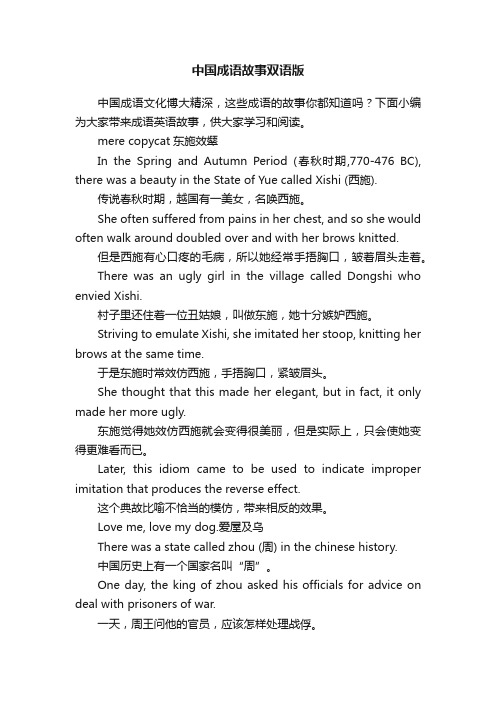
中国成语故事双语版中国成语文化博大精深,这些成语的故事你都知道吗?下面小编为大家带来成语英语故事,供大家学习和阅读。
mere copycat东施效颦In the Spring and Autumn Period (春秋时期,770-476 BC), there was a beauty in the State of Yue called Xishi (西施).传说春秋时期,越国有一美女,名唤西施。
She often suffered from pains in her chest, and so she would often walk around doubled over and with her brows knitted.但是西施有心口疼的毛病,所以她经常手捂胸口,皱着眉头走着。
There was an ugly girl in the village called Dongshi who envied Xishi.村子里还住着一位丑姑娘,叫做东施,她十分嫉妒西施。
Striving to emulate Xishi, she imitated her stoop, knitting her brows at the same time.于是东施时常效仿西施,手捂胸口,紧皱眉头。
She thought that this made her elegant, but in fact, it only made her more ugly.东施觉得她效仿西施就会变得很美丽,但是实际上,只会使她变得更难看而已。
Later, this idiom came to be used to indicate improper imitation that produces the reverse effect.这个典故比喻不恰当的模仿,带来相反的效果。
Love me, love my dog.爱屋及乌There was a state called zhou (周) in the chinese history.中国历史上有一个国家名叫“周”。
英文版中国成语故事
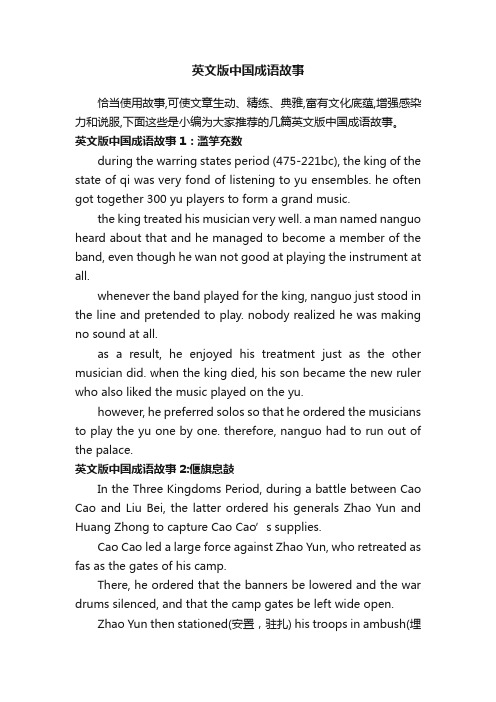
英文版中国成语故事恰当使用故事,可使文章生动、精练、典雅,富有文化底蕴,增强感染力和说服,下面这些是小编为大家推荐的几篇英文版中国成语故事。
英文版中国成语故事1:滥竽充数during the warring states period (475-221bc), the king of the state of qi was very fond of listening to yu ensembles. he often got together 300 yu players to form a grand music.the king treated his musician very well. a man named nanguo heard about that and he managed to become a member of the band, even though he wan not good at playing the instrument at all.whenever the band played for the king, nanguo just stood in the line and pretended to play. nobody realized he was making no sound at all.as a result, he enjoyed his treatment just as the other musician did. when the king died, his son became the new ruler who also liked the music played on the yu.however, he preferred solos so that he ordered the musicians to play the yu one by one. therefore, nanguo had to run out of the palace.英文版中国成语故事2:偃旗息鼓In the Three Kingdoms Period, during a battle between Cao Cao and Liu Bei, the latter ordered his generals Zhao Yun and Huang Zhong to capture Cao Cao’s supplies.Cao Cao led a large force against Zhao Yun, who retreated as fas as the gates of his camp.There, he ordered that the banners be lowered and the war drums silenced, and that the camp gates be left wide open.Zhao Yun then stationed(安置,驻扎) his troops in ambush(埋伏) nearly. When Cao Cao arrived and saw the situation, he immediately suspected a trap and withdrew his forces.This idiom is nowadays used to indicate metaphorically(隐喻地) halting an attack or ceasing all activities.英文版中国成语故事3:破镜重圆in the northern and southern dynasties when the state of chen (a.d. 557-589) was facing its demise(死亡,终止) , xu deyan, husband of the princess, broke a bronze mirror into halves.each of them kept a half as tokens(代币,符号) in case they were separated. soon afterwards, they did lose touch with each other, but the two halves of the mirror enabled them to be reunited.this idiom is used to refer to the reunion of a couple after they lose touch or break up.。
成语故事大全英文版
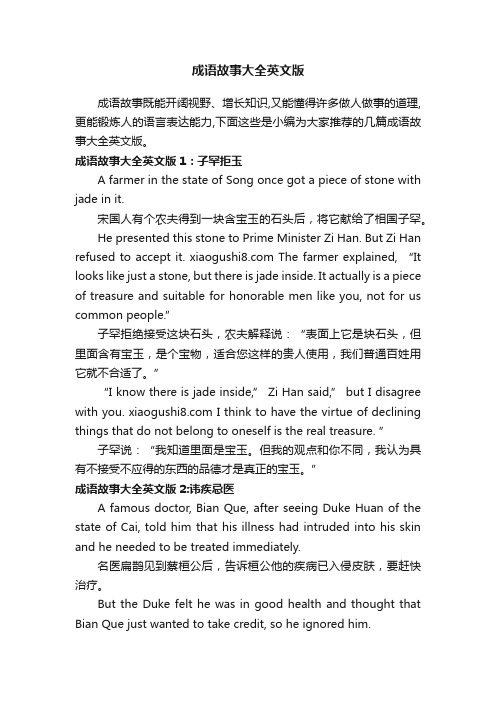
成语故事大全英文版成语故事既能开阔视野、增长知识,又能懂得许多做人做事的道理,更能锻炼人的语言表达能力,下面这些是小编为大家推荐的几篇成语故事大全英文版。
成语故事大全英文版1:子罕拒玉A farmer in the state of Song once got a piece of stone with jade in it.宋国人有个农夫得到一块含宝玉的石头后,将它献给了相国子罕。
He presented this stone to Prime Minister Zi Han. But Zi Han refused to accept it. The farmer explained, “It looks like just a stone, but there is jade inside. It actually is a piece of treasure and suitable for honorable men like you, not for us common people.”子罕拒绝接受这块石头,农夫解释说:“表面上它是块石头,但里面含有宝玉,是个宝物,适合您这样的贵人使用,我们普通百姓用它就不合适了。
”“I know there is jade inside,” Zi Han said,” but I disagree with you. I think to have the virtue of declining things that do not belong to oneself is the real treasure. ”子罕说:“我知道里面是宝玉。
但我的观点和你不同,我认为具有不接受不应得的东西的品德才是真正的宝玉。
”成语故事大全英文版2:讳疾忌医A famous doctor, Bian Que, after seeing Duke Huan of the state of Cai, told him that his illness had intruded into his skin and he needed to be treated immediately.名医扁鹊见到蔡桓公后,告诉桓公他的疾病已入侵皮肤,要赶快治疗。
英语成语故事精选(5篇)

【导语】成语故事包涵着我国从古代到现在的⼤道理⼤智慧,通过描写⽣活的⼀些简单的事,让我们感觉到有趣从⽽明⽩需要知道的,成语故事是我国历史的⼀部分,成语是历史的积淀,每⼀个成语的背后都有⼀个含义深远的故事,是我国⼏千年以来⼈民智慧的结晶。
下⾯是⽆忧考整理分享的英语成语故事,欢迎阅读与借鉴,希望能够为⼤家带来帮助,同时也希望给你们带来⼀些参考的作⽤,如果喜欢就请继续关注⽆忧考的后续更新吧!1.英语成语故事:画饼充饥 This idiom comes from Records of Three Kingdoms Kingdom of Wei Biography of Lu Yu. When Lu Yu, the minister of the State of Wei was young, his parents and brothers all died one after another, and he became an orphan. In such a difficult situation, he still studied very hard. Finally he became a talented person and served as a high officialof hisstate.Hewassouprightin performing his official duties that he was promoted to the minister of the Board of Civil Office, in charge of the officials' appointments and removals. Owing to the vacancy of Lu Yu's original post, it had to fill up a new official for it. Although there were many officials to recommend some well-known people for the post, all were refused by Emperor Wen. He only let Lu Yu do it and also pointed out:"It depends on you whether we can find the right person for the important post. But we can't choose someone only with fame in stead of his real ability. You see, the fame is just like drawing cakes on the ground to allay hungry." Then Lu expressed his idea:" You are right, YourMajesty, selections should depend on their real learning and abilities. But the real fame is still very important, such as self-possession and high moral character. So we should select people with both of them." Now we use it to describe comforting oneself with unrealistic thoughts, without solving practical problemsand feeding on illusions.2.英语成语故事:黔驴技穷 In ancient times there were no donkeys in Guizhou province. Somebody brought a donkey from somewhere and tied it to a tree at the foot of a mountain. A tiger saw the donkey, and thought that it must be a fearsome(可怕的) monster. It hide behind a tree and spied on the donkey. When the donkey brayed(叫) , the tiger was frightened, thinking that the donkey was about to devour(吞⾷,毁灭) it. After a while, seeing that the donkey had not moved, the tiger approached it and teased it. The donkey became angry, and kicked the tiger. The tiger thought to itself: "Its then all it is capable of?" It then jumped on the donkey and ate it. This idiom is used to mean that one has exhauseted one's skills.3.英语成语故事:骑虎难下 Yan Jian was the regent(摄政王) of the last king of Northern Zhou(557-581). His wife advised him: "Northern Zhou is dying. Now it is as if you are riding on the back of a tiger. It will be dangerous to dismount(下马,下车) . You can do nothing but continue." Yan Jian thought this quite reasonable. Later, he founded the Sui Dynasty, and united China once more. This idom is used as a metaphor meaning that one is in a difficult situation and cannot help but ontinue to pursue one's sourse.4.英语成语故事:破釜沉⾈ during the late years of the qi dynasty(221-206bc), xiang yu led a rebellion. after crossing the zhang river, xiang yu ordered his men to sink all their boats and break their cooking pots. he issued each soldier three days' rations(给养) and warned them that there was no way to retreat; the only thing they could do to survive was to advance and fight. after mine fierce battles, the qin army was finally defeated. this idiom is used to indicate one's firm determination to achieve one's goal at any cost.5.英语成语故事:名落孙⼭ In the Song Dynasty(960-1279) there was a joker called Sun Shan. One year he went to take the imperial examination, and came bottom of the list of successful candidates. Back in his hometown, one of his neighbours asked him whether the neighbour's son had also passed. Sun Shan said, with a smile: "Sun Shan was the last on the list, your son came after Sun Shan." Later, people used this idiom to indicate failing in an examination or competition.。
成语故事(中英对照)

成语故事(中英对照)第一篇:成语故事(中英对照)抱薪救火战国末期,秦国向魏国接连发动大规模的进攻,魏国无力抵抗,大片土地都被秦军占领了。
到公元前273年,秦国又一次向魏国出兵,势头空前猛烈。
魏王把大臣们召来,愁眉苦脸地问大家有没有使秦国退兵的办法。
大臣们由于经过多年的战乱,提起打仗就吓得哆嗦,谁也不敢谈“抵抗”二字。
在这大兵压境的危急时刻,多数大臣都劝魏王,用黄河以北和太行山以南的大片土地为代价,向秦王求和。
谋士苏代听了这些话,很不以为然,忙上前对魏王说:“大王,他们是因为自己胆小怕死,才让您去卖国求和,根本不为国家着想。
您想,把大片土地割让给秦国虽然暂时满足了秦王的野心,但秦国的欲望是无止境的,只要魏国的土地没割完,秦军就不会停止进攻我们。
”说到这里,苏代讲了一个故事:从前有一个人,他的房子起火了,别人劝他快用水去浇灭大火,但他不听,偏抱起一捆柴草去救火,是因为他不懂得柴草不但不能灭火反而能助长火势的道理。
大王若同意拿着魏国土地去求和,不就等于抱着柴草救火吗?”尽管苏代讲得头头是道,但是胆小的魏王只顾眼前的太平,还是依大臣们的意见把魏国大片土地割让给秦国。
到公元225年,果然秦军又向魏国大举进攻,包围了国都大梁,掘开黄河大堤让洪水淹没了大梁城,魏国终于被秦国灭掉了。
故事出自《史记·魏世家》。
成语“抱薪救火”比喻用错误的方法去消灭祸害,结果反而使祸害扩大。
Carrying Faggots to Put Out a Fire In the last years of the Warring States period, the State of Qin attacked the State of Wei on a large scale repeatedly and occupied large areas of land, for the State of Wei was too weak to defend itself.In 273 B.B., the qinarmy launched another attack upon the State of Wei with a momentum more vigorous than ever.The king of the State of Wei summoned his officials,and asked with a worried look if anyone could propose a way to defeat the Qin army.After years of chaos caused by the wars,the officials trembled when fighting was mentioned, and no one dared to speak ofresistance.At the critical moment when a large enemy force was bearing down upon the border, most of the offinials persuaded the king to sue for peace, at the cost of giving away to the State of Qin the large area of land north of the Huanghe River and south of the Taihang Mountain.However Su Dai, a counsellor, did not agree.He hurried up to the king and said:“Your Majesty, they don't think about the interests of the country at all.It is just because they are cowardly and afraid of death that they ask you to sue for peace by betraying the country.Of course you can temperarily satisfy the ambition of the king of the State of Qin is insatiably greedy.It will never stop assaulting us until our land is totally given away.”Once there was a man w hose house was on fire.People told him to put out the fire with water, but he would not listen.Instead, he carried a faggot to put out the fire, only to make the fire fiercer.That was because he didn't know that,instead of putting out the fire, faggots could only make it burning more vigorously.Isn't it equivalent to carrying faggots to put out a fire if you agree to sue for peace at the cost of the land of the State of Wei?“Though Su Dai's argument was very convincing, the king accepted the suggestion of those officials and gave away to the State of Qin a large area of the land of the State of Wei.For the king of the State of Wei was cowardly and only cared for peace at the moment.As might be expected,the Qin army assaulted the State of Wei on a large scale in 225 B.C.,surroundingthe capital city Daliang and flooding it by digging open the dykes of the Huanghe River.The State of Wei was finally destroyed by the State of Qin.This story appears in the Historical Records Written by Sima Qian.The set phrase”car rying faggots to put out a fire"is used to mean adopting a wrong method to save a situation and ending up by making it worse.第二篇:中英对照彩图成语故事集锦中英对照彩图成语故事集锦一、中国古代成语故事 1.惊弓之鸟Birds Startled by the Mere Twang of a Bowstring战国时期(公元前403―221年中国中原地区各诸侯国连年争战的时代)魏国有个名叫更羸的人。
中英文成语故事精选三篇
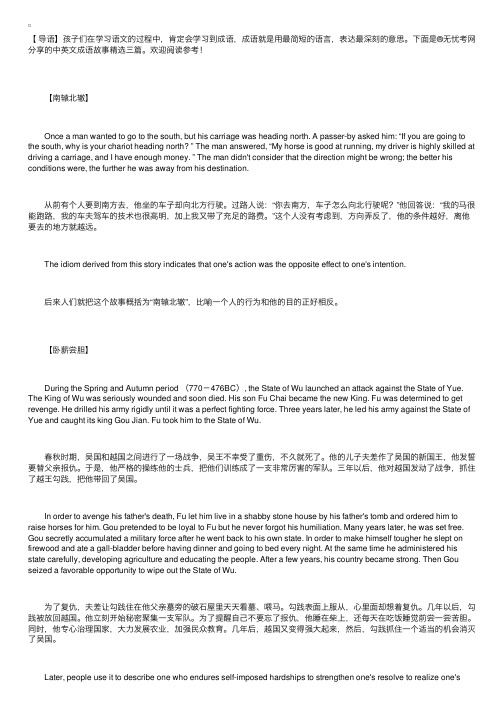
【导语】孩⼦们在学习语⽂的过程中,肯定会学习到成语,成语就是⽤最简短的语⾔,表达最深刻的意思。
下⾯是®⽆忧考⽹分享的中英⽂成语故事精选三篇。
欢迎阅读参考! 【南辕北辙】 Once a man wanted to go to the south, but his carriage was heading north. A passer-by asked him: “If you are going to the south, why is your chariot heading north? ” The man answered, “My horse is good at running, my driver is highly skilled at driving a carriage, and I have enough money. ” The man didn't consider that the direction might be wrong; the better his conditions were, the further he was away from his destination. 从前有个⼈要到南⽅去,他坐的车⼦却向北⽅⾏驶。
过路⼈说:“你去南⽅,车⼦怎么向北⾏驶呢?”他回答说:“我的马很能跑路,我的车夫驾车的技术也很⾼明,加上我⼜带了充⾜的路费。
”这个⼈没有考虑到,⽅向弄反了,他的条件越好,离他要去的地⽅就越远。
The idiom derived from this story indicates that one's action was the opposite effect to one's intention. 后来⼈们就把这个故事概括为“南辕北辙”,⽐喻⼀个⼈的⾏为和他的⽬的正好相反。
【卧薪尝胆】 During the Spring and Autumn period (770-476BC), the State of Wu launched an attack against the State of Yue. The King of Wu was seriously wounded and soon died. His son Fu Chai became the new King. Fu was determined to get revenge. He drilled his army rigidly until it was a perfect fighting force. Three years later, he led his army against the State of Yue and caught its king Gou Jian. Fu took him to the State of Wu. 春秋时期,吴国和越国之间进⾏了⼀场战争,吴王不幸受了重伤,不久就死了。
经典成语故事英文版简短【五篇】
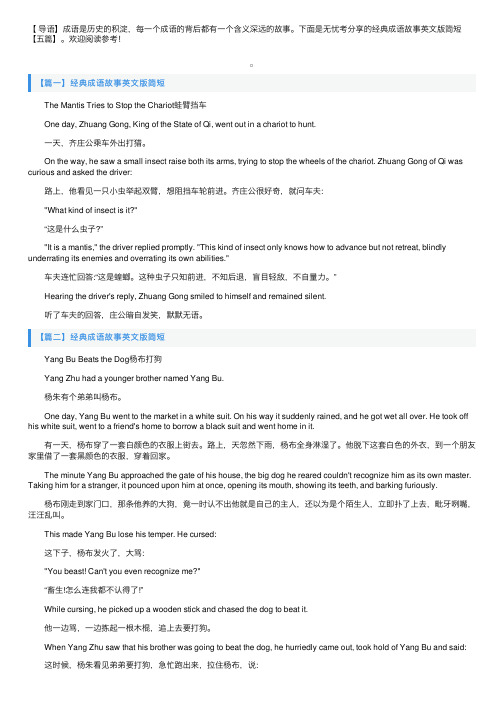
【导语】成语是历史的积淀,每⼀个成语的背后都有⼀个含义深远的故事。
下⾯是⽆忧考分享的经典成语故事英⽂版简短【五篇】。
欢迎阅读参考!【篇⼀】经典成语故事英⽂版简短 The Mantis Tries to Stop the Chariot蛙臂挡车 One day, Zhuang Gong, King of the State of Qi, went out in a chariot to hunt. ⼀天,齐庄公乘车外出打猎。
On the way, he saw a small insect raise both its arms, trying to stop the wheels of the chariot. Zhuang Gong of Qi was curious and asked the driver: 路上,他看见⼀只⼩⾍举起双臂,想阻挡车轮前进。
齐庄公很好奇,就问车夫: "What kind of insect is it?" “这是什么⾍⼦?” "It is a mantis," the driver replied promptly. "This kind of insect only knows how to advance but not retreat, blindly underrating its enemies and overrating its own abilities." 车夫连忙回答:“这是蝗螂。
这种⾍⼦只知前进,不知后退,盲⽬轻敌,不⾃量⼒。
” Hearing the driver's reply, Zhuang Gong smiled to himself and remained silent. 听了车夫的回答,庄公暗⾃发笑,默默⽆语。
【篇⼆】经典成语故事英⽂版简短 Yang Bu Beats the Dog杨布打狗 Yang Zhu had a younger brother named Yang Bu. 杨朱有个弟弟叫杨布。
中英文成语故事精选三篇

中英文成语故事精选三篇【南辕北辙】Once a man wanted to go to the south, but his carriage was heading north. A passer-by asked him:“If you are going to the south, why is your chariot heading north? ” The man answered, “My horse is good at running, my driver is highly skilled at driving a carriage, and I have enough money. ”The man didn't consider that the direction might be wrong;the better his conditions were, the further he was away from his destination.从前有个人要到南方去,他坐的车子却向北方行驶。
过路人说:“你去南方,车子怎么向北行驶呢?”他回答说:“我的马很能跑路,我的车夫驾车的技术也很高超,加上我又带了充足的路费。
”这个人没有考虑到,方向弄反了,他的条件越好,离他要去的地方就越远。
The idiom derived from this story indicates that one's action was the opposite effect to one's intention.后来人们就把这个故事概括为“南辕北辙”,比喻一个人的行为和他的目的正好相反。
【卧薪尝胆】During the Spring and Autumn period (770-476BC), the State of Wu launched an attack against the State of Yue. The King of Wu was seriously wounded and soon died. His son Fu Chai became the new King. Fu was determined to get revenge.He drilled his army rigidly until it was a perfect fighting force. Three years later, he led his army against the Stateof Yue and caught its king Gou Jian. Fu took him to the State of Wu.春秋时期,吴国和越国之间进行了一场战争,吴王不幸受了重伤,不久就死了。
(完整版)成语故事英文版

1、守株待兔:相传在战国时代宋国,有一个农民,日出而作,日入而息.遇到好年景,也不过刚刚吃饱穿暖;一遇灾荒,可就要忍饥挨饿了.他想改善生活,但他太懒,胆子又特小,干什么都是又懒又怕,总想碰到送上门来的意外之财。
奇迹终于发生了。
深秋的一天,他正在田里耕地,周围有人在打猎。
吆喝之声四处起伏,受惊的小野兽没命的奔跑。
突然,有一只兔子,不偏不倚,一头撞死在他田边的树根上。
当天,他美美地饱餐了一顿。
从此,他便不再种地。
一天到晚,守着那神奇的树根,等着奇迹的出现。
成语“守株待兔”,比喻亡想不劳而得,或死守狭隘的经验,不知变通。
staying by a stump waiting for more hares to come and dash themselves against itthis story took place more than 2,000 years ago,in the warring states period(475-221b.c.).tradition has it that in the state of song at that time there was a man who was famous for staying by a stump waiting formore hares to come and dash themselves against it.he was a yong farmer,and his family had been farmers for generations.year after year and generation after generation, farmers used to sow in spring and harvest in autumn,beginning to work at sunrise and retiring at sunset.in good harvest years,they could only have enough food to eat and enough clothing to wear.if there was a famine due to crop failure,they had to go hungry.this young farmer wanted to improve his life.but he was too lazy and too cowardly.being lazy and cowardly over everything,he often dreamed of having unexpected blessings.a miracle took place at last. one day in late autumn,when he was ploughing in the field,two groups of people were hunting nearby.as shoutings were rising one after another,scared hares were running desperately.suddenly,a blind hare dashed itself headlong against the stump of a dead tree in his field and died.that day,he ate his fill.from that day on,he no longer went in for farming again.from morning till night,he stayed by that miraculous stump,waiting for miracles to take place again.this story comes from"the five vermin"in the works of han ter generations often use the set phrase"staying by a stump waiting for more hares to come and dash themselves against it"toshow grusting to chance and windfalls or dreaming to reap without sowing.it is also used to show adhering to narrow experiences and not being able to be flexible.try to help the Shoots grow by pulling them upward/spoil things by excessive enthusiasm2、拔苗助长There once was an impatient farmer who lived during the Song Dynasty.(sòng cháo,960-1279 AD).春秋时代,宋国有个急性子的农夫。
英文版的成语故事
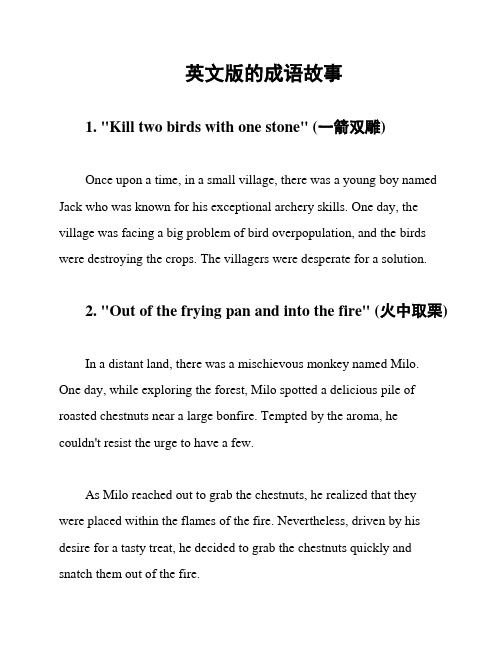
英文版的成语故事1. "Kill two birds with one stone" (一箭双雕)Once upon a time, in a small village, there was a young boy named Jack who was known for his exceptional archery skills. One day, the village was facing a big problem of bird overpopulation, and the birds were destroying the crops. The villagers were desperate for a solution.2. "Out of the frying pan and into the fire" (火中取栗)In a distant land, there was a mischievous monkey named Milo. One day, while exploring the forest, Milo spotted a delicious pile of roasted chestnuts near a large bonfire. Tempted by the aroma, he couldn't resist the urge to have a few.As Milo reached out to grab the chestnuts, he realized that they were placed within the flames of the fire. Nevertheless, driven by his desire for a tasty treat, he decided to grab the chestnuts quickly and snatch them out of the fire.Unfortunately, as Milo grabbed the chestnuts, he not only burned his hands but also dropped most of them into the fire. In his attempt to escape the heat of the flames, he ended up in an even worse situation.The phrase "out of the frying pan and into the fire" originated from this incident, representing a situation where someone tries to escape a problem but ends up in a more challenging or dangerous situation.3. "A blessing in disguise" (因祸得福)In a small village, a poor farmer named Peter owned a small piece of land. One day, a powerful storm struck the village, destroying houses and crops. Peter's house and land were severely damaged, leaving him devastated.Neighboring villagers sympathized with Peter's misfortune and came to help him rebuild his house and recover his land. During the reconstruction process, they discovered a hidden treasure buried deep under Peter's land.The unexpected discovery of the treasure brought immense wealth and prosperity to Peter. He realized that the storm, which initially seemed like a misfortune, turned out to be a blessing in disguise.4. "Catch someone red-handed" (当场抓住)In a bustling town, there was a notorious thief named Tom. The townspeople were tired of Tom's repeated thefts but struggled to catch him in the act. Determined to put an end to his criminal activities, the townspeople devised a plan.They set up a bait by placing valuable goods in a shop, knowing that Tom couldn't resist the temptation. As expected, one night, Tom broke into the shop, intending to steal the valuable items. Little did he know that the townspeople had been lying in wait.As Tom was about to grab the valuable goods, the townspeople burst into the shop, catching him "red-handed". Tom's shock and surprise were evident as the stolen goods slipped from his hands.结束以上是几个常见的英语成语故事,它们既有趣又有教育意义。
英文成语故事5篇精选_最新英文成语故事中英文版
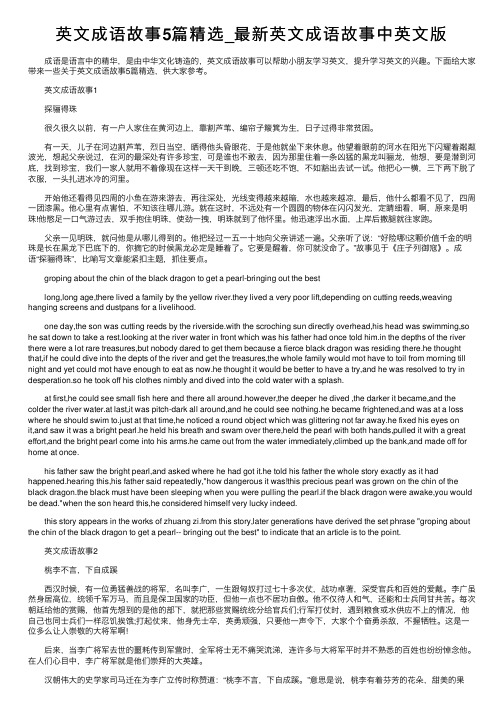
英⽂成语故事5篇精选_最新英⽂成语故事中英⽂版成语是语⾔中的精华,是由中华⽂化铸造的,英⽂成语故事可以帮助⼩朋友学习英⽂,提升学习英⽂的兴趣。
下⾯给⼤家带来⼀些关于英⽂成语故事5篇精选,供⼤家参考。
英⽂成语故事1探骊得珠很久很久以前,有⼀户⼈家住在黄河边上,靠割芦苇、编帘⼦簸箕为⽣,⽇⼦过得⾮常贫困。
有⼀天,⼉⼦在河边割芦苇,烈⽇当空,晒得他头昏眼花,于是他就坐下来休息。
他望着眼前的河⽔在阳光下闪耀着粼粼波光,想起⽗亲说过,在河的最深处有许多珍宝,可是谁也不敢去,因为那⾥住着⼀条凶猛的⿊龙叫骊龙,他想,要是潜到河底,找到珍宝,我们⼀家⼈就⽤不着像现在这样⼀天⼲到晚,三顿还吃不饱,不如豁出去试⼀试。
他把⼼⼀横,三下两下脱了⾐服,⼀头扎进冰冷的河⾥。
开始他还看得见四周的⼩鱼在游来游去,再往深处,光线变得越来越暗,⽔也越来越凉,最后,他什么都看不见了,四周⼀团漆⿊。
他⼼⾥有点害怕,不知该往哪⼉游。
就在这时,不远处有⼀个圆圆的物体在闪闪发光,定睛细看,啊,原来是明珠!他憋⾜⼀⼝⽓游过去,双⼿抱住明珠,使劲⼀拽,明珠就到了他怀⾥。
他迅速浮出⽔⾯,上岸后撒腿就往家跑。
⽗亲⼀见明珠,就问他是从哪⼉得到的。
他把经过⼀五⼀⼗地向⽗亲讲述⼀遍。
⽗亲听了说:“好险哪!这颗价值千⾦的明珠是长在⿊龙下巴底下的,你摘它的时候⿊龙必定是睡着了。
它要是醒着,你可就没命了。
”故事见于《庄⼦列御寇》。
成语“探骊得珠”,⽐喻写⽂章能紧扣主题,抓住要点。
groping about the chin of the black dragon to get a pearl-bringing out the bestlong,long age,there lived a family by the yellow river.they lived a very poor lift,depending on cutting reeds,weaving hanging screens and dustpans for a livelihood.one day,the son was cutting reeds by the riverside.with the scroching sun directly overhead,his head was swimming,so he sat down to take a rest.looking at the river water in front which was his father had once told him.in the depths of the river there were a lot rare treasures,but nobody dared to get them because a fierce black dragon was residing there.he thought that,if he could dive into the depts of the river and get the treasures,the whole family would mot have to toil from morning till night and yet could mot have enough to eat as now.he thought it would be better to have a try,and he was resolved to try in desperation.so he took off his clothes nimbly and dived into the cold water with a splash.at first,he could see small fish here and there all around.however,the deeper he dived ,the darker it became,and the colder the river water.at last,it was pitch-dark all around,and he could see nothing.he became frightened,and was at a loss where he should swim to.just at that time,he noticed a round object which was glittering not far away.he fixed his eyes on it,and saw it was a bright pearl.he held his breath and swam over there,held the pearl with both hands,pulled it with a great effort,and the bright pearl come into his arms.he came out from the water immediately,climbed up the bank,and made off for home at once.his father saw the bright pearl,and asked where he had got it.he told his father the whole story exactly as it had happened.hearing this,his father said repeatedly,"how dangerous it was!this precious pearl was grown on the chin of the black dragon.the black must have been sleeping when you were pulling the pearl.if the black dragon were awake,you would be dead."when the son heard this,he considered himself very lucky indeed.this story appears in the works of zhuang zi.from this story,later generations have derived the set phrase "groping about the chin of the black dragon to get a pearl-- bringing out the best" to indicate that an article is to the point.英⽂成语故事2桃李不⾔,下⾃成蹊西汉时候,有⼀位勇猛善战的将军,名叫李⼴,⼀⽣跟匈奴打过七⼗多次仗,战功卓著,深受官兵和百姓的爱戴。
英语的成语故事
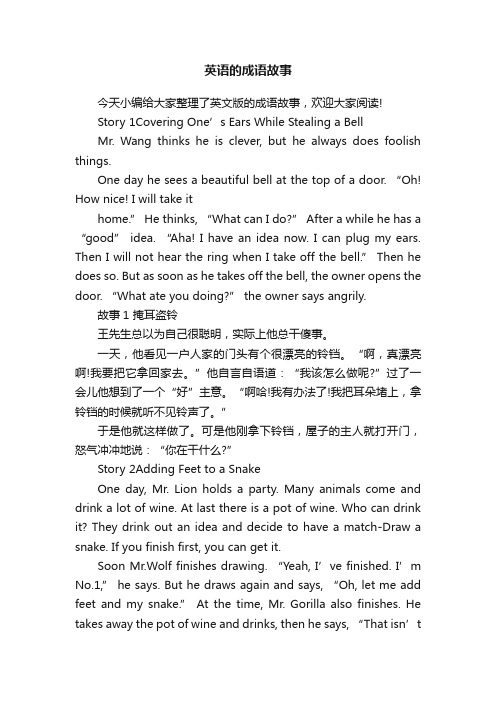
英语的成语故事今天小编给大家整理了英文版的成语故事,欢迎大家阅读!Story 1Covering One’s Ears While Stealing a BellMr. Wang thinks he is clever, but he always does foolish things.One day he sees a beautiful bell at the top of a door. “Oh! How nice! I will take ithome.” He thinks, “What can I do?” After a while he has a “good” idea. “Aha! I have an idea now. I can plug my ears. Then I will not hear the ring when I take off the bell.” Then he does so. But as soon as he takes off the bell, the owner opens the door. “What ate you doing?” the owner says angrily.故事1 掩耳盗铃王先生总以为自己很聪明,实际上他总干傻事。
一天,他看见一户人家的门头有个很漂亮的铃铛。
“啊,真漂亮啊!我要把它拿回家去。
”他自言自语道:“我该怎么做呢?”过了一会儿他想到了一个“好”主意。
“啊哈!我有办法了!我把耳朵堵上,拿铃铛的时候就听不见铃声了。
”于是他就这样做了。
可是他刚拿下铃铛,屋子的主人就打开门,怒气冲冲地说:“你在干什么?”Story 2Adding Feet to a SnakeOne day, Mr. Lion holds a party. Many animals come and drink a lot of wine. At last there is a pot of wine. Who can drink it? They drink out an idea and decide to have a match-Draw a snake. If you finish first, you can get it.Soon Mr.Wolf finishes drawing. “Yeah, I’ve finished. I’m No.1,” he says. But he draws again and says, “Oh, let me add feet and my snake.” At the time, Mr. Gorilla also finishes. He takes away the pot of wine and drinks, then he says, “That isn’ta snake. Snakes have no feet. I get the wine.”故事2 画蛇添足一天,狮子先生举行一场聚会,许多动物都来了,他们喝很多酒。
英语成语故事大全(5篇)
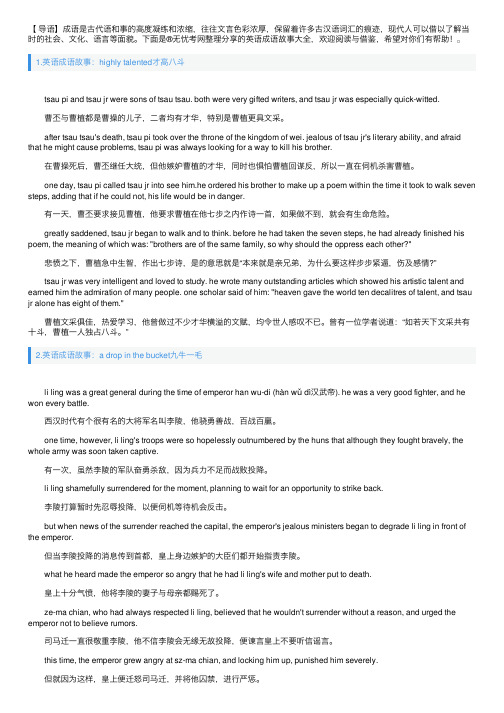
【导语】成语是古代语和事的⾼度凝练和浓缩,往往⽂⾔⾊彩浓厚,保留着许多古汉语词汇的痕迹,现代⼈可以借以了解当时的社会、⽂化、语⾔等⾯貌。
下⾯是®⽆忧考⽹整理分享的英语成语故事⼤全,欢迎阅读与借鉴,希望对你们有帮助!1.英语成语故事:highly talented才⾼⼋⽃tsau pi and tsau jr were sons of tsau tsau. both were very gifted writers, and tsau jr was especially quick-witted.曹丕与曹植都是曹操的⼉⼦,⼆者均有才华,特别是曹植更具⽂采。
after tsau tsau's death, tsau pi took over the throne of the kingdom of wei. jealous of tsau jr's literary ability, and afraid that he might cause problems, tsau pi was always looking for a way to kill his brother.在曹操死后,曹丕继任⼤统,但他嫉妒曹植的才华,同时也惧怕曹植回谋反,所以⼀直在伺机杀害曹植。
one day, tsau pi called tsau jr into see him.he ordered his brother to make up a poem within the time it took to walk seven steps, adding that if he could not, his life would be in danger.有⼀天,曹丕要求接见曹植,他要求曹植在他七步之内作诗⼀⾸,如果做不到,就会有⽣命危险。
greatly saddened, tsau jr began to walk and to think. before he had taken the seven steps, he had already finished his poem, the meaning of which was: "brothers are of the same family, so why should the oppress each other?"悲愤之下,曹植急中⽣智,作出七步诗,是的意思就是“本来就是亲兄弟,为什么要这样步步紧逼,伤及感情?”tsau jr was very intelligent and loved to study. he wrote many outstanding articles which showed his artistic talent and earned him the admiration of many people. one scholar said of him: "heaven gave the world ten decalitres of talent, and tsau jr alone has eight of them."曹植⽂采俱佳,热爱学习,他曾做过不少才华横溢的⽂赋,均令世⼈感叹不已。
10篇中国成语故事英文版
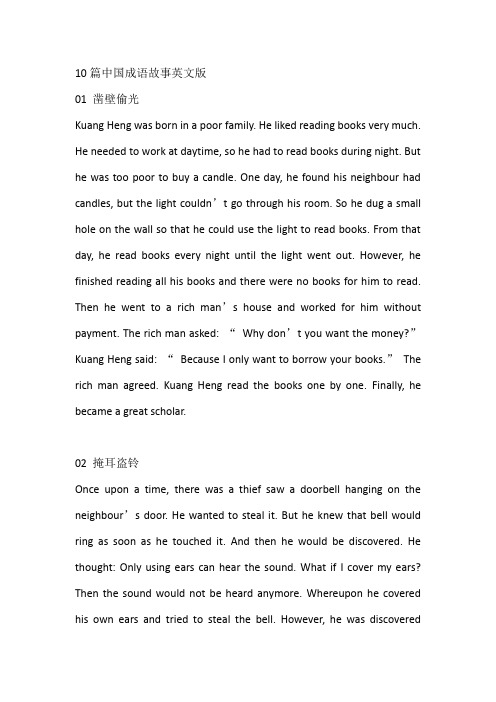
10篇中国成语故事英文版01 凿壁偷光Kuang Heng was born in a poor family. He liked reading books very much. He needed to work at daytime, so he had to read books during night. But he was too poor to buy a candle. One day, he found his neighbour had candles, but the light couldn’t go through his room. So he dug a small hole on the wall so that he could use the light to read books. From that day, he read books every night until the light went out. However, he finished reading all his books and there were no books for him to read. Then he went to a rich man’s house and worked for him without payment. The rich man asked: “Why don’t you want the money?”Kuang Heng said: “Because I only want to borrow your books.”The rich man agreed. Kuang Heng read the books one by one. Finally, he became a great scholar.02 掩耳盗铃Once upon a time, there was a thief saw a doorbell hanging on the neighbour’s door. He wanted to steal it. But he knew that bell would ring as soon as he touched it. And then he would be discovered. He thought: Only using ears can hear the sound. What if I cover my ears? Then the sound would not be heard anymore. Whereupon he covered his own ears and tried to steal the bell. However, he was discoveredimmediately when he touched the bell.03 邯郸学步During the Warring States period, a young man lived in Shouling. He always felt that he was not so perfect as he thought. One day, he heard that people in Handan walked in a gracefully way, so he decided to learn to walk there.One morning, he set off for Handan without telling anyone. Upon arrival at Handan, he was surprised when he saw the situation. Everyone walked in a different but gracefully way, children walking actively, the old walking steady and women walking charmingly. So he made up his mind to learn how the people of the State of Zhao walked in Handan. No matter how hard he tried, he was unable to learn the gait of the people there. On the contrary, he even forgot completely how he walked in Shouling. In the end, he had no choice but to crawl back to his hometown.04 囫囵吞枣Long ago, there was a young man who bought many fruits, like pears and dates. He sat at the roadside to eat them. An old man saw him and said: “Eating too many pears is good for teeth, but bad for your body.”The man asked: “How about dates?”The old man answered: “The dates are good for body but bad for teeth.”The young man thought for awhile and said: “I've got a good idea! I can eat pears with teeth and don't swallow them. And I can swallow dates without chewing.”Then he put a date into his mouth and swallowed it immediately. Unluckily, he was choked by the date.05 杞人忧天In the State of Qi, there was a man who was haunted by the fear that the sky might fall. He was so worried that he could neither eat nor sleep well. His friend said to him: “The sky is gathered by gas. We are living in the air. It is impossible to fall.”After hearing this, the man set his fear at ease instantly. His friend was also delightful.06 同舟共济In the Spring and Autumn period, the State of Wu and the State of Yue didn’t get along well. They had been fighting against each other for years.People in each country also didn’t have a good relationship. One day, the people of Wu and the people of Yue happened to be on the same boat to cross a river. At the beginning, they didn’t say a word with each other. When the boat sailed to the center of the river, a strong wind came. In no time, huge waves hit people’s faces. It seemed that the boat would sink at any time. Just then, they forgot all the hatred between two countries and began to help each other just like they were family. In theend, they safely got to the river bank under everyone’s effort.07 班门弄斧During the Warring States period, there wasa carpenter named Lu Ban. He was good at making woody tools. One day, a youngman passed by a red gate. He held up an axe with his hand and said: “This axeis really good. I can make the greatest tools in the world with it.”Hearing this, people around here all laughed. One person asked: “So, can you make amore beautiful gate than this one?”“That’s so easy! I was a student of Lu Ban before! Making a similar gate is like a piece of cake!”The young man said arrogantly. “But the gate was made by Lu Ban!”All people said.08 杯水车薪One evening, Zhao Da passed by a tea house when he came back from cutting firewood.There were a lot of people drinking tea there. He put the firewood outside and walked into the tea house. When he finished a cup of tea, he found his firewood on fire. Zhao Da shouted: “Oh no! It’s on fire!”He took a cup of water, ran out of the door and splashed the water on the fire. Other people in the tea house also took their own cups to fight the fire. However, instead of being put out, the fire burned even harder.09 自相矛盾A young man ran a business in the market. One day, he held up a shieldand said proudly: “My shield is very strong. It can stop any spear in the world.”Then he held up his spear and bragged: “My spear is very sharp. No matter how strong a shield is, my spear can pierce it.”People all around here laughed when they heard the words of the young man. One of them asked: “So, according to what you said, your spear is the sharpest. No matter how strong a shield is, your spear can pierce it. And your shield is also the strongest. No matter how sharp a spear is, it can’t pierce your shield. Well, what will happen if I pierce your shield with your spear?" The young man was too embarrassed to say anything.10 按图索骥In the Spring and Autumn Period, a man named Bo Le is an expert in identifying a good horse. He put his experiences in this area into his book Physiognomy Of Horses, which illustrated all kinds of horses with rich pictures and words. His son wanted to learn his skill about identifying a good horse. Then he read the book carefully over and over again. He thought he had mastered the skill. Once he saw a toad along the road, whose forehead was in accord with the features of a good horse. Then he rushed to his father and told him he had found a good steed. Hearing this, Bo Le didn’t know whether to cry or laugh. He had to reply jokingly: “This horse does too well in jumping, so it’s hard for us to rein it. ”。
两则英语成语故事
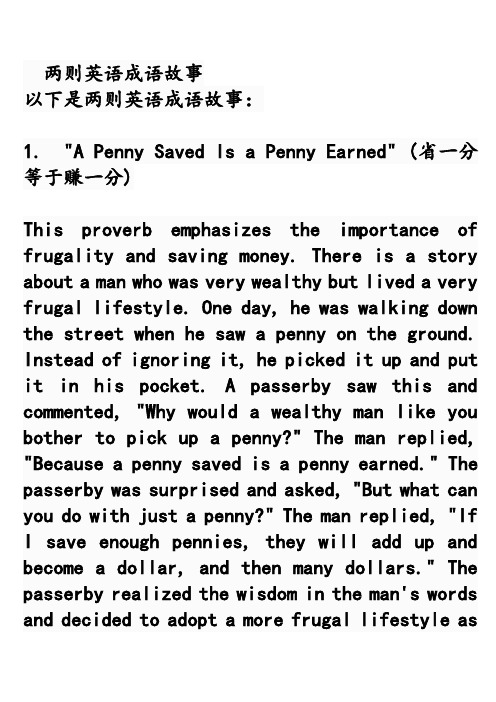
两则英语成语故事以下是两则英语成语故事:1. "A Penny Saved Is a Penny Earned" (省一分等于赚一分)This proverb emphasizes the importance of frugality and saving money. There is a story about a man who was very wealthy but lived a very frugal lifestyle. One day, he was walking down the street when he saw a penny on the ground. Instead of ignoring it, he picked it up and put it in his pocket. A passerby saw this and commented, "Why would a wealthy man like you bother to pick up a penny?" The man replied, "Because a penny saved is a penny earned." The passerby was surprised and asked, "But what can you do with just a penny?" The man replied, "If I save enough pennies, they will add up and become a dollar, and then many dollars." The passerby realized the wisdom in the man's words and decided to adopt a more frugal lifestyle aswell.这句谚语强调了节俭和省钱的重要性。
英文成语故事(通用8篇)

英文成语故事英文成语故事(通用8篇)成语故事是我国历史的一部分,成语是历史的积淀,每一个成语的背后都有一个含义深远的故事,是我国几千年以来人民智慧的结晶。
其特点是深刻隽永,言简意赅。
下面是小编给大家带来英文成语故事,希望对大家有帮助!英文成语故事篇1In the spring and autumn period, a man in the state of song raised monkeys. The monkeys could understand what he said.As the man became poor, he wanted to reduce the monkeys' food. He first suggested that he give them three acorns(橡子) in the morning and four acorns in the evening.Thereupon, the monkeys protested angrily. Then their owner said, "how about four in the morning and three in the evening?" The monkeys were satisfied with that.This idiom originally meant to befool others with tricks. later it is used to mean to keep changing one's mind.英文成语故事篇2In the Warring States Period, a man in the state of Chu was offering a sacrifice(祭品) to his ancestors. After the ceremony, the man gave a beaker of wine to his servants.The servants thought that there was not enought wine for all of them, and decided to each draw a picture of snake; the one who finished the picture first would get the wine.One of them drew very rapidly. Seeing that the others were still busy drawing, he added feet to the snake.At this moment, another man finished, snatched the beaker(烧杯,大口杯) and drank the wine, saying,"A snake doesn't have feet. How can you add feet to a snake?"This idiom refers to ruining a venture by doing unnecessary and surplus things.英文成语故事篇3In the Spring and Autumn Period, a farmer in the State of Song was one day working in the fields when he saw a rabbit bump into a tree stump(树桩) accidentally and break its neck.The farmer took the rabbit home, and cooked himself a delicious meal.That night he thought, 'I needn't work so hard. All I have to do is wait for a rabbit each day by the stump.'So from then on he gave up farming, and simply sat by the stump waiting for rabbits to come and run into it.This idiom satirizes(讽刺,挖苦) those who just wait for a stroke of luck, rather than making efforts to obtain what they need.英文成语故事篇4Near China's northern borders lived a man well versed in the practices of Taoism. His horse, for no reason at all, got into the territory of the northern tribes. Everyone commiserated with him."Perhaps this will soon turn out to be a blessing," said his father.After a few months, his animal came back, leading a fine horse from the north. Everyone congratulated him."Perhaps this will soon turn out to be a cause of misfortune," said his father.Since he was well-off and kept good horses his son became fond of riding and eventually broke his thigh bone falling from a horse. Everyone commiserated with him."Perhaps this will soon turn out to be a blessing," said his father.One year later, the northern tribes started a big invasion of the border regions. All able-bodied young men took up arms and fought against the invaders, and as a result, around the border nine out of ten men died. This man's son did not join in the fighting because he was crippled and so both the boy and his father survived.战国时期,靠近北部边城,住着一个老人,名叫塞翁。
古代成语故事双语版两则
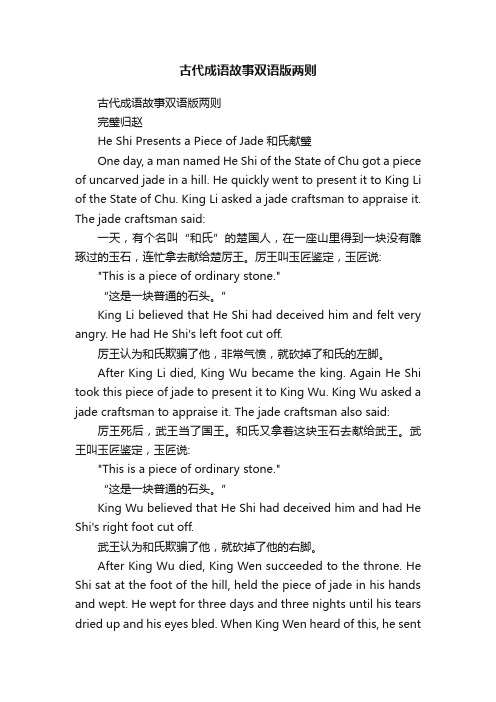
古代成语故事双语版两则古代成语故事双语版两则完璧归赵He Shi Presents a Piece of Jade和氏献璧One day, a man named He Shi of the State of Chu got a piece of uncarved jade in a hill. He quickly went to present it to King Li of the State of Chu. King Li asked a jade craftsman to appraise it. The jade craftsman said:一天,有个名叫“和氏”的楚国人,在一座山里得到一块没有雕琢过的玉石,连忙拿去献给楚厉王。
厉王叫玉匠鉴定,玉匠说: "This is a piece of ordinary stone."“这是一块普通的石头。
”King Li believed that He Shi had deceived him and felt very angry. He had He Shi's left foot cut off.厉王认为和氏欺骗了他,非常气愤,就砍掉了和氏的左脚。
After King Li died, King Wu became the king. Again He Shi took this piece of jade to present it to King Wu. King Wu asked a jade craftsman to appraise it. The jade craftsman also said: 厉王死后,武王当了国王。
和氏又拿着这块玉石去献给武王。
武王叫玉匠鉴定,玉匠说:"This is a piece of ordinary stone."“这是一块普通的石头。
”King Wu believed that He Shi had deceived him and had He Shi's right foot cut off.武王认为和氏欺骗了他,就砍掉了他的右脚。
成语故事大全英文精选_成语故事大全
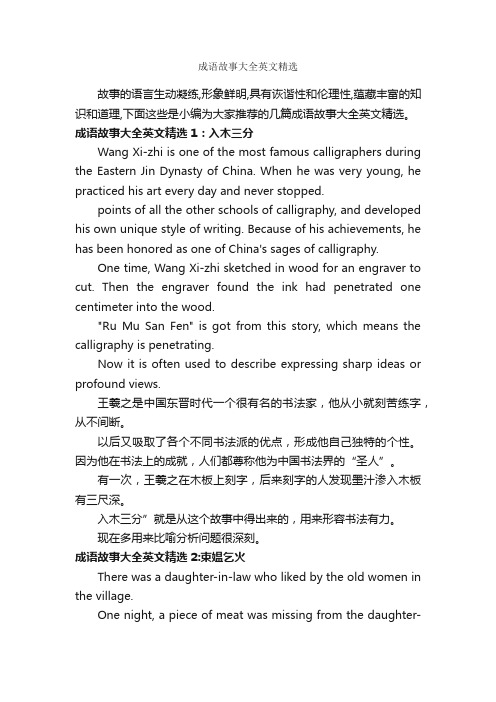
成语故事大全英文精选故事的语言生动凝练,形象鲜明,具有诙谐性和伦理性,蕴藏丰富的知识和道理,下面这些是小编为大家推荐的几篇成语故事大全英文精选。
成语故事大全英文精选1:入木三分Wang Xi-zhi is one of the most famous calligraphers during the Eastern Jin Dynasty of China. When he was very young, he practiced his art every day and never stopped.points of all the other schools of calligraphy, and developed his own unique style of writing. Because of his achievements, he has been honored as one of China's sages of calligraphy.One time, Wang Xi-zhi sketched in wood for an engraver to cut. Then the engraver found the ink had penetrated one centimeter into the wood."Ru Mu San Fen" is got from this story, which means the calligraphy is penetrating.Now it is often used to describe expressing sharp ideas or profound views.王羲之是中国东晋时代一个很有名的书法家,他从小就刻苦练字,从不间断。
以后又吸取了各个不同书法派的优点,形成他自己独特的个性。
因为他在书法上的成就,人们都尊称他为中国书法界的“圣人”。
中英文成语故事集锦三篇
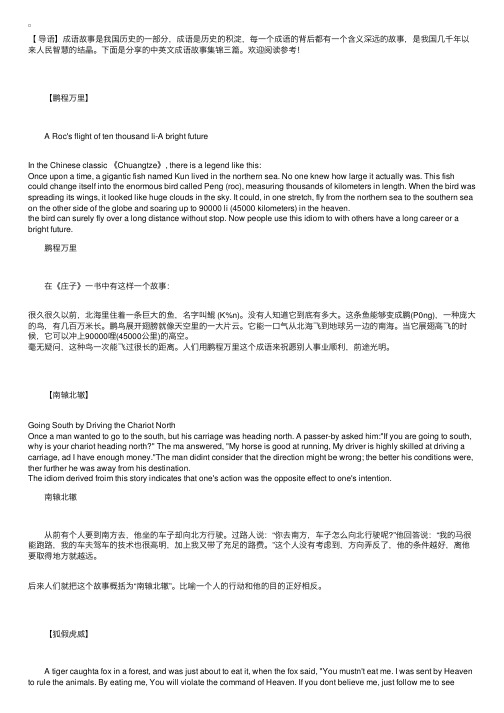
【导语】成语故事是我国历史的⼀部分,成语是历史的积淀,每⼀个成语的背后都有⼀个含义深远的故事,是我国⼏千年以来⼈民智慧的结晶。
下⾯是分享的中英⽂成语故事集锦三篇。
欢迎阅读参考! 【鹏程万⾥】 A Roc's flight of ten thousand li-A bright futureIn the Chinese classic 《Chuangtze》, there is a legend like this:Once upon a time, a gigantic fish named Kun lived in the northern sea. No one knew how large it actually was. This fish could change itself into the enormous bird called Peng (roc), measuring thousands of kilometers in length. When the bird was spreading its wings, it looked like huge clouds in the sky. It could, in one stretch, fly from the northern sea to the southern sea on the other side of the globe and soaring up to 90000 li (45000 kilometers) in the heaven.the bird can surely fly over a long distance without stop. Now people use this idiom to with others have a long career or a bright future. 鹏程万⾥ 在《庄⼦》⼀书中有这样⼀个故事:很久很久以前,北海⾥住着⼀条巨⼤的鱼,名字叫鲲 (K%n)。
- 1、下载文档前请自行甄别文档内容的完整性,平台不提供额外的编辑、内容补充、找答案等附加服务。
- 2、"仅部分预览"的文档,不可在线预览部分如存在完整性等问题,可反馈申请退款(可完整预览的文档不适用该条件!)。
- 3、如文档侵犯您的权益,请联系客服反馈,我们会尽快为您处理(人工客服工作时间:9:00-18:30)。
In the Western Jin Dynasty there were two young men.One of them was Zu Ti and the other was Liu Kun.Both of them were men of ideals and integrity who were chivalrous and of a sanguine disposition.They not only wrote excellent articles but also were fond of practising martial arts to keep fit, in order to render meritorious service to the country.Both of them were chief clerks responsible for document administration in Luoyang.Although in appearance the Jin Dynasty had jurisdiction of the Central Plains comprising the middle and lower reaches of the Haunch and threatened by foreign invasion.Zu Ti and Liu Kun often talked about the country's situation till late into the night,and each time they talking very excitedly again.
在中华民族五千年的传统文化中,成语故事是汉语中的璀璨明珠,是中华民族语言的瑰宝。我们可以通过这些历史成语故事去了解中华民族悠久的历史、高超的智慧和历久弥新的语言文字。下面小编为大家带来双语经典成语故事两篇,欢迎大家阅读!
双语经典成语故事:望梅止渴
One summer, Cao Cao was leading his troops in a punitive expedition against Zhang Xiu. It was extraordinarily hot. The burning sun was like a fire, and the sky was cloudless. The soldiers were walking on the winding mountain paths. The dense forest and the hot rocks exposed to the sun on both sides of the paths made the soldiers feel suffocated. By noontime the soldiers' clothes were wet through with sweat, and the marching speed slowed down. Some solders of weak physique even fainted on the roadside.
一天,祖逖又和刘琨谈得十分兴奋,刘琨不知什么时候睡着了,祖逖却久久沉浸在谈话的兴奋之中,不能入睡。“喔,喔,喔--”荒原上的雄鸡叫了起来,祖逖一跃而起,踢醒了刘琨:“听,这雄鸡啼鸣多么振奋人心呀,快起来练剑吧!”于是,两人操起剑来,在高坡上对舞。从此,他俩每天清早听到头一声鸣叫,一定来到荒原上抖擞神练起剑来。
This story comes from "The Fake Tangery" in Anecdotes of This World by Liu Yiqing of the Southern Dynasties period (420-589). From this story, people have derived the set phrase "quenching thirst by watching plums" to refer to trying to comfort oneself of others by idle dreams.
Deeply moved by Zu Ti's patriotic passion,Liu Kun was determined to devote himself to his homeland.Once he wrote to his family:"At the time when the country is in dire peril,I am resolved to dedicate myselt to the service of my country.I often fear that I might lag behind Zu Ti in rendering serfact,I am behind him..."
西晋人祖逖和刘琨,都是性格开朗、仗义好侠的志士。年轻时不但文章写得好,而且都喜欢练武健身,决心报效祖国。当时,晋朝表面上还管辖着中原大地,但实际上已是内忧外患,风雨飘摇了。祖逖和刘琨一谈起国家局势,总是慷慨万分,常常聊到深夜。
Liu Kun fell asleep without knowing it,but Zu Ti was too excited to fall asleep." Cock-a-doodle-doo,"came the crow of rooster in the wasteland.Zu Ti jumped up and kicked Liu Kun awake:"Listen.How inspiring the rooster's crow is.Let's get up and practised on a slope.From then on,they kept practising sword playing vigorously and energetically in the wasteland every day when they heard the first crow in the morning.
有一年夏天,曹操率领部队去讨伐张绣,天气热得出奇,骄阳似火,天上一丝云彩也没有,部队在弯弯曲曲的山道上行走,两边密密的树木和被阳光晒得滚烫的山石,让人透不过气来。到了中午时分,士兵的衣服都湿透了,行军的速度也慢下来,有几个体弱的士兵竟晕倒在路边。
Seeing that the marching speed was slower and slower, Cao Cao was very worried because he feared that he might bungle the chance of winning the battle. But how could they quicken their speed? Cao Cao at once callde the guide and asked him on the quiet whether there was a source of water nearby. The guide shook his head, saying that the spring water was on the other side of the mountain, which was very far to have to make a detour to reach. Cao Cao realized that time didn't permit them to make such a detour. After thinking for a moment, he said to the guide, "Keep quiet. I'll find a way out." He knew that it would be to no avail to order his troops to quicken the steps. He had a brain wave and found a good solution. He spurred his horse and came to the head of the column. Pointing his horsewhip to the front, Cao Cao said, "Soldiers, I know there is a big forest of plums ahead. The plums there are both big and delicious. let's hurry along, and we will reach the forest of plums after bypassing this hill." When the solders heard this, they immediately slobbered. Picturing in their minds the sweet and sour flavour of the plums, the soldiers felt as if they were actually eating the plums, the soldiers felt as if they were actually eating the plums themselves. The morale greatly boosted, the soldiers quickened their steps a great deal automatically.
刘琨被祖逖的爱国热情深深感动,决心献身于祖。一次他给家人的信中写道:“在国家危难时刻,我经常‘枕戈待旦’(枕着兵器睡觉一直到天明),立志报国,常担心落在祖逖后边,不想他到底走到我的前头了!……”
